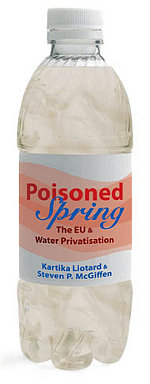Weeklog Kartika Liotard: Water Management
Weeklog Kartika Liotard: Water Management
Last Monday was World Water Day. For the 18th time the UN called attention to the issues associated with water. Happily, there's nothing wrong with the quality of Dutch tap water: it's absolutely safe! According to the law, bottled water must be of the same high quality. But for a half-litre of the stuff you can pay as much as € 2, which means that a small bottle costs as much as 1,500 litres (330 Imp.Gallons/396 US gallons) of tap water.
Polluted
There are countries in which the tap water is so polluted that you have no choice, and there are others where tap water is unknown. No-one can do without water, no-one is free to choose not to use this vital substance, and this is reason enough to say that drinking water is not a product to be left to the free market. Monopolise its supply and you're in charge, you can demand whatever you feel like. Public drinking water fountains have disappeared from our railway stations, while bottled water is on sale at something like 3,000 times the cost.
Instrument of power
Prince Claus, late member of our royal house, showed great discernment when he opted for 'water management’ as a multifarious field of activity for his son. I can still remember when an interviewer, somewhat astonished by the term, was unable to say what it might mean. Since then things have changed, however, and 'water management' produces 122 million hits on Google, having become an ever more politicised theme into which the aforementioned son, Prince Willem-Alexander, can stick his 'politically neutral' nose. More and more people are beginning to understand that water can be enlisted in the struggle for power: in order to spread 'market-think', to make war, to oppress the underprivileged, as a weapon of terror to make people ill or keep them weak.
Three dry facts about water management
Israelis make war with water: they shamelessly fill their swimming pools in their illegal settlements while their Palestinian neighbours are forced to make do with inadequate supplies, supplies which are, moreover, polluted, water from which children contract disease.
The production of a single cotton shirt requires 2,700 litres, a cup of coffee 140 litres and the average sandwich 40 litres of water.
The Dutch use on average 2.3 million litres of water per year, almost twice as much as the global mean.
Too much and too little
In some places too much water brings problems, while others suffer from a terrible shortage. All the more reason for democracy to maintain its grip. Neoliberalism seeks, however, to throw our drinking water to the market. Its adherents want to see essential services sold off to the highest bidder, although we know that this would be at the cost of fair distribution and of reliability. When state services are privatised, one thing is always forgotten, and that is effective and independent control.
Market fundamentalists
 In the EU too there is a lobby of market fundamentalists at work who want to see water suppliers flogged off. They are convinced that the market is wholesome and healing, and speak not of 'citizens' but of 'consumers'. They don't mention the fact that the privatisation of water in England and Wales has led to the pursuit of profit and the raising of tariffs. Some politicians accuse the companies involved of profiteering, forgetting that it was they who imposed a single-minded economic morality.
In the EU too there is a lobby of market fundamentalists at work who want to see water suppliers flogged off. They are convinced that the market is wholesome and healing, and speak not of 'citizens' but of 'consumers'. They don't mention the fact that the privatisation of water in England and Wales has led to the pursuit of profit and the raising of tariffs. Some politicians accuse the companies involved of profiteering, forgetting that it was they who imposed a single-minded economic morality.
Economic lens
The EU has also had a hand in ensuring that social problems are looked at first and foremost through an economic lens. My plea is this: if you want every inhabitant of the planet to have access to clean, safe drinking water and good sanitary provisions, don't invest your hopes or money in neoliberal solutions.
You can find an analysis of the problems involved in the book Poisoned Spring, which I recently wrote with Steve McGiffen, Professor of International Relations at the American Graduate School in Paris and editor of Spectrezine. In this book we show that the threat of drought and flood comes not only from meteorological phenomena but from poor water management. Privatisation of water suppliers is not the solution. On the contrary. The dominant economic orthodoxy within the EU poses a threat rather than offering a solution in the struggle against global inequality. 'Market think' blocks progress towards the ready availability of clean water and sound sanitation.
It's this which the EU should be working on, not the selling off of public property. Read our arguments in Poisoned Spring, the EU and water privatization [Pluto Press, 2009 ISBN: 978-0-7453-2789-4, 288 pag.].
